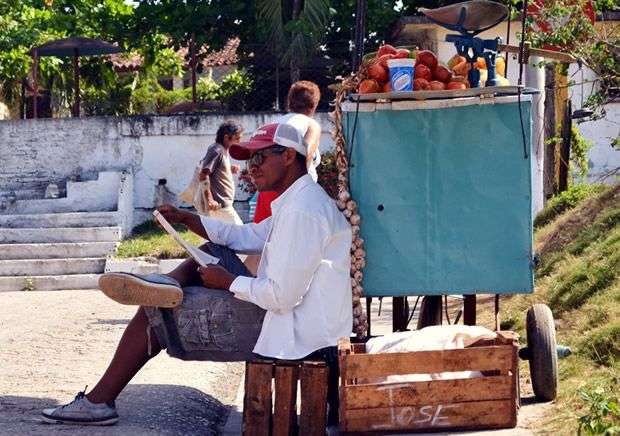To say that the price of a particular good “is extremely high” is an undisputable fact: its exchange value is so high that it becomes unaffordable for a majority. However, in the case of agricultural products, a more proper expression would be “the price is like the ones of the wheelbarrows”, which defines not only one of the ways this products have been marketed for a while, but rather its high standard price, as if there were a trade union of these vendors.
After being passed among the new self-employment alternative at the end of 2010, the figure of the wheel barrower has emerged as one of the most frequent targets of the consumers´ dissatisfaction, who do not accept that a kilogram “of whatever” could cost three times its actual price in a market, only for being transported by wheelbarrow.
Supposedly, this ” is justified” by the fact that agro products vendors add the service of bringing the good to the door of the house to the price of the product, but in practice, we know that they have turned their carts into small markets (some wheelbarrows are almost trailers, roofed and with several floors) in semi-static stalls placed in any corner, even on main roads, as opposed to the rules set forth.
Again and again, people have claimed to put a brake through the top price mechanism to the excessive speculation of these traders, which has not been accepted by the connoisseurs and decision makers of that theme: in the end tight supply – they argue- will impose that prices obey restrictive market conditions (behaving upwards, regardless of any administrative action). And finally- they assure-the problem could only be solved through an increase in agro products production, which must come from applying more stimulating purchasing policies to peasants, among other measures (such as the recent Decree-Law 300, which provides better facilities for the delivery of land in usufruct).
In theory, the Cuban Government offers 21 agricultural products that are marketed by the State Agricultural Markets (MAE for its Spanish acronym) at affordable prices, but this desire has not corresponded with reality due to the repeated failure of trade commitments that must ensure provision to these destinations, which has been denounced again and again in the media.
These facilities offer an average of five products that are most of the time in poor state, which at the same time reveals the source of supply of wheel barrowers, who despite the lack of a wholesale market, have always offered “everything and with the best quality.”
Cubans have another option in the so called Supply and Demand Markets (MAOD for its Spanish acronym), but these have not really been an alternative, since their products are similar to those of the wheelbarrows in prohibitively high prices-and certainly in top -quality too.
For several months there was no response to the fact that a wheelbarrow could absorb, in exchange for the ingredients for two lunches, the monthly wage of a Cuban average worker. In the middle of last year, during one of the last sessions of the Seventh Legislature of People’s Power there were announced certain measures to be implemented in late 2012, which would impact on marketing chains of Havana, Artemisa and Mayabeque (a triangle where the situation is more critical than in the rest of the country, given the high dependence of the capital of these two producing provinces, and the level of speculation that a limited supply can generate in the urban environment). This, however, was another of the rescheduled debts for the new calendar.
On May this year, almost a year later, it was reported that the Council of Ministers passed such arrangements that will be gradually applied, which shall not be an immediate relief on household spending on food, but will enable to expect, at medium term, prices down from the clouds (ie the wheelbarrows).
As announced, the Havana trading company will open a wholesale market (first formally made for the self-employed sector). This space will be rented for its management to a cooperative (also the first non-agricultural that will be operational), and it may be attended by any entity, directly, without an intermediary, but only after having fulfilled its commitments to the State, an entity that will simplify the purchase of the aforementioned 21 products to just 10, the basics ones, at centralized prices. The surplus of these ten products and the rest of the production will be at their producers´ disposal (with the exception of the products they have initially under contract).
This will bring benefits in two ways: the producer will no longer wait impatiently for anyone to collect his merchandise, under the risk of failing, and will also have the opportunity to freely set the price of marketing, without having to set aside a profit margin for who performed the buying and selling management (something was usually done by several people, which became more expensive the product price).
On the other hand, these provisions will allow buyers to have a legal space for wholesale acquisition of fresh merchandise (owners of ¨paladares¨ (private restaurants), for example) and their purchase invoices will feel decompression of all those who no longer will obtain profits with the resale of the same “bananas and potatoes”, since their departure from the farm to the consumer’s bag.
As already announced, the measures also include the reorganization of the markets network (MAE, MAOD, stalls and kiosks), as current production volumes do not justify their excessive numbers, whose less burdensome tax policy should also promote a relief in the cost of agro-products, I mean, a fall from wheelbarrows …. pardon, from the clouds.
Photos: Beatriz Verde Limón











